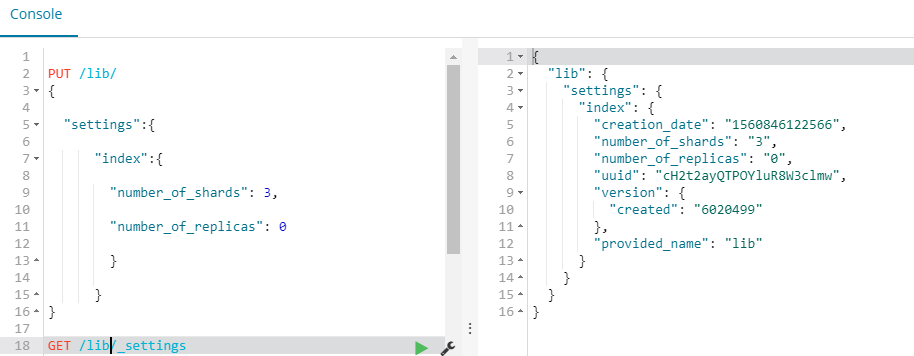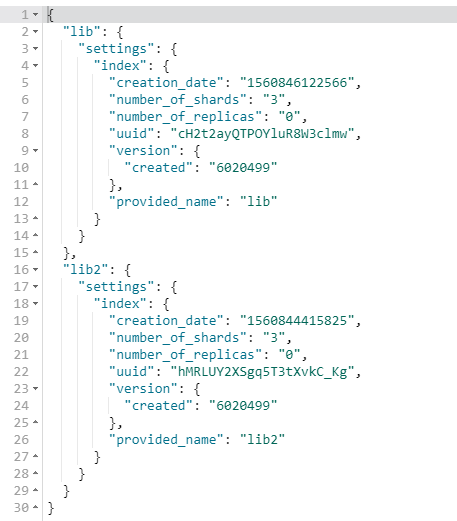使用ElasticSearch API 实现CRUD
添加索引:
指定分片和副本:
PUT /lib/
{
"settings":{ "index":{ "number_of_shards": 5, "number_of_replicas": 1 } }}
不指定分片和副本:
PUT lib
查看索引信息:
GET /lib/_settings

GET _all/_settings

添加文档:
指定ID:
PUT /lib/user/1
{ "first_name" : "Jane", "last_name" : "Smith", "age" : 32, "about" : "I like to collect rock albums", "interests": [ "music" ]}
不指定ID:
POST /lib/user/
{ "first_name" : "Douglas", "last_name" : "Fir", "age" : 23, "about": "I like to build cabinets", "interests": [ "forestry" ]}
查看文档:
GET /lib/user/1
GET /lib/user/
GET /lib/user/1?_source=age,interests

更新文档:
PUT /lib/user/1
{ "first_name" : "Jane", "last_name" : "Smith", "age" : 36, "about" : "I like to collect rock albums", "interests": [ "music" ]}
删除一个文档
DELETE /lib/user/1
删除一个索引
DELETE /lib
批量获取文档
使用es提供的Multi Get API:
使用Multi Get API可以通过索引名、类型名、文档id一次得到一个文档集合,文档可以来自同一个索引库,也可以来自不同索引库
使用curl命令:
curl 'http://hadoop-001:9200/_mget' -d '{
"docs":[
{ "_index": "lib", "_type": "user", "_id": 1 }, { "_index": "lib", "_type": "user", "_id": 2 }
]}'
在客户端工具中:
GET /_mget
{ "docs":[ { "_index": "lib", "_type": "user", "_id": 1 }, { "_index": "lib", "_type": "user", "_id": 2 }, { "_index": "lib", "_type": "user", "_id": 3 } ]}
可以指定具体的字段:
GET /_mget
{ "docs":[ { "_index": "lib", "_type": "user", "_id": 1, "_source": "interests" }, { "_index": "lib", "_type": "user", "_id": 2, "_source": ["age","interests"] } ]}
获取同索引同类型下的不同文档:
GET /lib/user/_mget
{ "docs":[ { "_id": 1 }, { "_type": "user", "_id": 2 } ]}
GET /lib/user/_mget
{ "ids": ["1","2"]}
使用Bulk API 实现批量操作
bulk的格式:
{action:{metadata}}\n
{requstbody}\n
action:(行为)
create:文档不存在时创建 update:更新文档 index:创建新文档或替换已有文档 delete:删除一个文档metadata:_index,_type,_idcreate 和index的区别
如果数据存在,使用create操作失败,会提示文档已经存在,使用index则可以成功执行。示例:
{"delete":{"_index":"lib","_type":"user","_id":"1"}}
批量添加:
POST /lib2/books/_bulk
{"index":{"_id":1}}
{"title":"Java","price":55}
{"index":{"_id":2}}
{"title":"Html5","price":45}
{"index":{"_id":3}}
{"title":"Php","price":35}
{"index":{"_id":4}}
{"title":"Python","price":50}
批量获取:
GET /lib2/books/_mget{
"ids": ["1","2","3","4"]}
删除:没有请求体
POST /lib2/books/_bulk
{"delete":{"_index":"lib2","_type":"books","_id":4}}
{"create":{"_index":"tt","_type":"ttt","_id":"100"}}
{"name":"lisi"}
{"index":{"_index":"tt","_type":"ttt"}}
{"name":"zhaosi"}
{"update":{"_index":"lib2","_type":"books","_id":"4"}}
{"doc":{"price":58}}
bulk一次最大处理多少数据量:
bulk会把将要处理的数据载入内存中,所以数据量是有限制的,最佳的数据量不是一个确定的数值,它取决于你的硬件,你的文档大小以及复杂性,你的索引以及搜索的负载。
一般建议是1000-5000个文档,大小建议是5-15MB,默认不能超过100M,可以在es的配置文件(即$ES_HOME下的config下的elasticsearch.yml)中。






